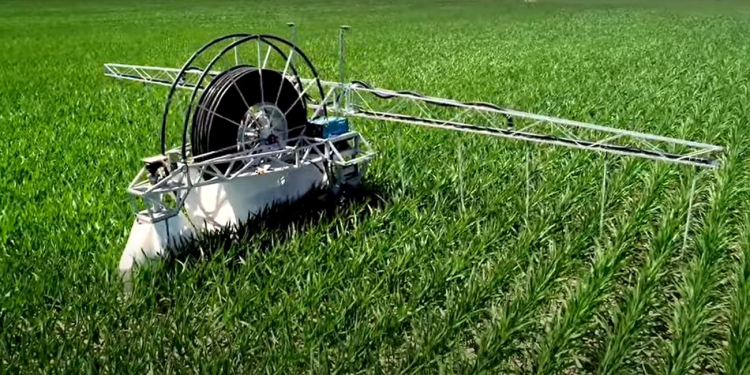The team at 360 Yield Center has introduced its newest product – 360 Rain – an autonomous watering system for row crops.
Gregg Sauder, founder of 360 Yield Center, says the system uses 40% less water then a center pivot and costs half as much as a drip tape irrigation system. “We want to help the crop through all stages and help corn to always have a perfect day,” Sauder says.

360 Rain is a three-wheel machine with 7’ height on the mainframe and 10’ clearance for the boom. The machine unwinds and rewinds a 3” hose, traveling down the rows and then returning on the same tramline. It uses two GPS RTK receivers to follow the planter pass precisely, and completely overlaps a 24-row planter swath with its 60’ boom featuring 12 drops. It moves at a speed range from 2” per second up to 8” per second, applying a target rate of 0.15” of water.
“We saw with the Y-Drop system how the crop responded to nitrogen being placed precisely to the row,” Sauder says. “With 360 Rain, we aren’t giving a crop a cold shower like we do when we run a center pivot. We’re putting water at the base of the plant, and we aren’t waiting until conditions are dry. We are constantly running the system in the field.”
The system design requires a well and hydrant installed in the field, and that one machine lives in one field its whole life.
“We’ve thought about the design of this as a 30-year asset, and we are targeting a full payback in five or less years,” says 360 Yield Center engineer Tim Sauder, who led the development of 360 Rain.

In its field trials in 2020, the company says they saw a 65-bushel response in corn and a 14.5-bushel response in soybeans to using the 360 Rain system.
“We’re an application company, so applying water in this way opens a huge window to think about other things,” Sauder says. “I think of this machine as a plant butler.”
He says the development team will continue to test applying nitrogen, micronutrients and other crop inputs in the 360 Rain.
“It’s time to swing for the fences and raise some big yields,” Sauder says. “I believe this is a game-changer.”
In 2021, the company will expand its testing to six machines in central Illinois with full sales being open for the 2023 season.








